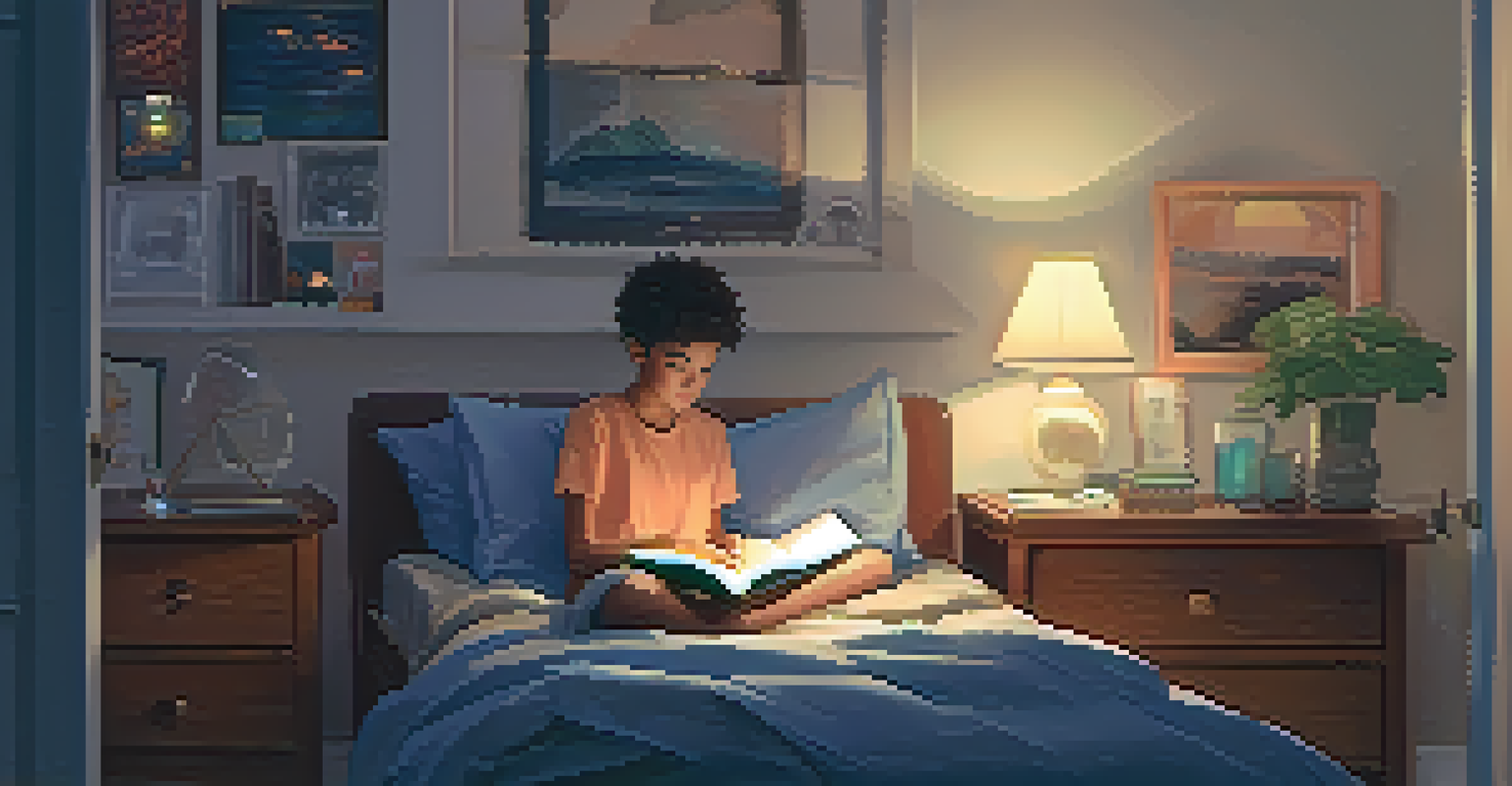Sleep Hygiene Strategies for Teens: A Guide to Better Rest

Understanding Sleep Hygiene: What Is It and Why It Matters
Sleep hygiene refers to a series of practices and habits that help improve the quality of sleep. For teens, good sleep hygiene is crucial as it directly impacts their mood, focus, and overall health. Poor sleep can lead to difficulties in school and decreased motivation, making it essential to establish healthy routines.
Sleep is the best meditation.
Think of sleep hygiene as the way you prepare for a big game or exam. Just as athletes have rituals to get in the zone, teens can adopt habits that signal it's time to wind down. By understanding these practices, teens can set themselves up for better sleep and improved daily performance.
In this guide, we will explore various strategies that can help teens create an ideal sleep environment, develop a consistent schedule, and engage in relaxation techniques. Each strategy is designed to make the transition to restful sleep smoother and more effective.
Establishing a Consistent Sleep Schedule: Key to Success
One of the most effective strategies for improving sleep is to establish a consistent sleep schedule. This means going to bed and waking up at the same time every day, even on weekends. This regularity helps regulate the body's internal clock, making it easier to fall asleep and wake up feeling refreshed.

Imagine trying to catch a train that always leaves at a different time. It would be stressful and confusing, right? The same goes for your sleep. A consistent schedule can help your body know when it's time to wind down and when it's time to rise and shine, leading to better sleep quality.
Sleep Hygiene Improves Quality of Rest
Establishing good sleep hygiene practices is essential for teens, as it directly affects their mood, focus, and overall health.
For teens, this might mean setting a bedtime that allows for 8-10 hours of sleep, depending on individual needs. It’s important to communicate this with family and friends, so they understand the importance of keeping this routine.
Creating a Relaxing Bedtime Routine: Wind Down Effectively
A relaxing bedtime routine can signal your body that it's time to transition from the busyness of the day to a restful night. This could include activities like reading, listening to calming music, or practicing mindfulness meditation. The goal is to find what helps you unwind and make it a regular part of your nightly routine.
The worst thing in the world is to try to sleep and not to.
Think of this routine as your personal sleep warm-up. Just as athletes need to cool down after a game, your mind and body need time to shift gears. A consistent pre-sleep routine helps reduce anxiety and prepares you for a peaceful night's sleep.
Teens should aim to start their bedtime routine at least 30 minutes before they plan to sleep. This allows ample time to relax and disconnect from screens, which can interfere with sleep quality.
Designing a Sleep-Friendly Environment: Set the Mood
Your sleep environment plays a significant role in the quality of your rest. A dark, quiet, and cool space can help signal to your body that it's time to sleep. Consider blackout curtains, earplugs, or even a white noise machine to create the ideal atmosphere for sleep.
Imagine trying to sleep in a brightly lit room with noise all around you—it's nearly impossible, right? By making small adjustments to your bedroom, you can create a sanctuary that promotes relaxation and slumber. The right environment can make a world of difference.
Consistent Sleep Schedule is Key
Maintaining a regular sleep schedule helps regulate the body's internal clock, making it easier to fall asleep and wake up refreshed.
Additionally, keeping your bedroom tidy and using comfortable bedding can enhance your sleep experience. This personalized touch can help you feel more relaxed and ready for a good night’s sleep.
Limiting Screen Time Before Bed: Unplug for Better Sleep
In our digital age, screens are everywhere, and they can significantly impact sleep quality. The blue light emitted from phones, tablets, and computers can disrupt the production of melatonin, the hormone that regulates sleep. To promote better sleep hygiene, it's wise to limit screen time at least an hour before bedtime.
Consider this: If you were to read a thrilling book right before bed, your mind might race with excitement, making it harder to fall asleep. The same principle applies to screens—engaging content can keep your brain active when it should be winding down. By unplugging and choosing quieter activities, you can ease into sleep more easily.
Encouraging a digital detox before bed isn’t just about reducing screen time; it also opens up opportunities for more relaxing activities like journaling or practicing gratitude. These habits can enhance well-being and prepare the mind for restful sleep.
Mindfulness and Relaxation Techniques: Calm Your Mind
Incorporating mindfulness and relaxation techniques can significantly enhance sleep quality. Practices such as deep breathing, progressive muscle relaxation, or yoga can help calm the mind and reduce stress. These techniques encourage relaxation and prepare the body for restful sleep.
Think of mindfulness as a way to train your mind to focus on the present, rather than worrying about the past or future. Just as athletes visualize their performance before a big event, mindfulness allows you to visualize peace and calm before sleep. This mental preparation can lead to better rest.
Mindfulness Techniques Enhance Sleep
Incorporating mindfulness and relaxation techniques can significantly improve sleep quality by calming the mind and reducing stress.
Teens can explore different techniques to find what resonates best with them. Apps or guided sessions can be helpful in getting started, making the process enjoyable and effective.
Nutrition and Sleep: Eating for Better Rest
What you eat and drink can impact your sleep quality. Consuming heavy meals, caffeine, or sugary snacks close to bedtime can interfere with your ability to fall asleep. Instead, opt for light snacks that promote sleep, such as bananas, almonds, or herbal tea.
Consider your body like a car; it needs the right fuel to run smoothly. Just as high-octane fuel keeps a sports car performing at its best, the right foods can help your body prepare for sleep. By making mindful eating choices, you can support your body’s natural sleep rhythms.

Encouraging healthy eating habits throughout the day can also contribute to better overall sleep. A balanced diet rich in fruits, vegetables, and whole grains can help regulate energy levels and promote healthier sleep patterns.
Knowing When to Seek Help: Signs of Sleep Disorders
Sometimes, despite our best sleep hygiene efforts, issues persist. It's important for teens to recognize signs of sleep disorders, such as insomnia, excessive daytime sleepiness, or difficulty concentrating. If sleep problems become a consistent issue, seeking guidance from a healthcare professional is essential.
Think of sleep disorders like a warning light on your car's dashboard—it's your body signaling that something needs attention. Just as you wouldn’t ignore a check engine light, it's crucial to pay attention to persistent sleep issues. Early intervention can lead to better outcomes.
Consulting with a doctor or sleep specialist can provide insights and possible solutions tailored to individual needs. Remember, prioritizing sleep is not just about feeling tired; it's about overall well-being and health.